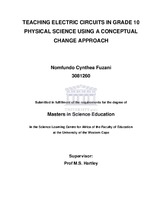| dc.contributor.advisor | Steytler, Nico | |
| dc.contributor.author | Wyngaard, Lisa Jade | |
| dc.date.accessioned | 2018-09-05T10:09:58Z | |
| dc.date.available | 2018-12-31T22:10:05Z | |
| dc.date.issued | 2018 | |
| dc.identifier.uri | http://hdl.handle.net/11394/6379 | |
| dc.description | Magister Legum - LLM (Public Law and Jurisprudence) | |
| dc.description.abstract | Electricity supply can be classified into three stages namely: generation, transmission and distribution, with the functions of generation and transmission being carried out by Eskom. In 2001, Eskom was converted from a statutory body into a public company having a share capital with its entire share capital held by the State. It is a major public entity and therefore an Organ of State and albeit that Eskom is classified as a public company, it is still a State-owned Enterprise. Municipalities purchase electricity from Eskom in bulk in order to carry out the distribution function and manage bulk supply of electricity to end-users in terms of the Local Government: Municipal Structures Act 117 of 1998 (Structures Act). Municipalities re-sell electricity purchased from Eskom to end-users as well as provide free basic electricity to indigent consumers. | |
| dc.language.iso | en | |
| dc.publisher | University of the Western Cape | |
| dc.subject | Termination/Interruption, Electricity Supply, Eskom, Default on Payments, Municipalities, Electricity, Paying Customers -End-users, Right to Electricity, Basic Services, Local Government: Municipal Systems Act 32 of 2000, Electricity Regulation Act 4 of 2006 | |
| dc.title | How can the rights of paying consumers to electricity be squared with the rights of Eskom to be paid?' | |
| dc.rights.holder | University of the Western Cape | |




